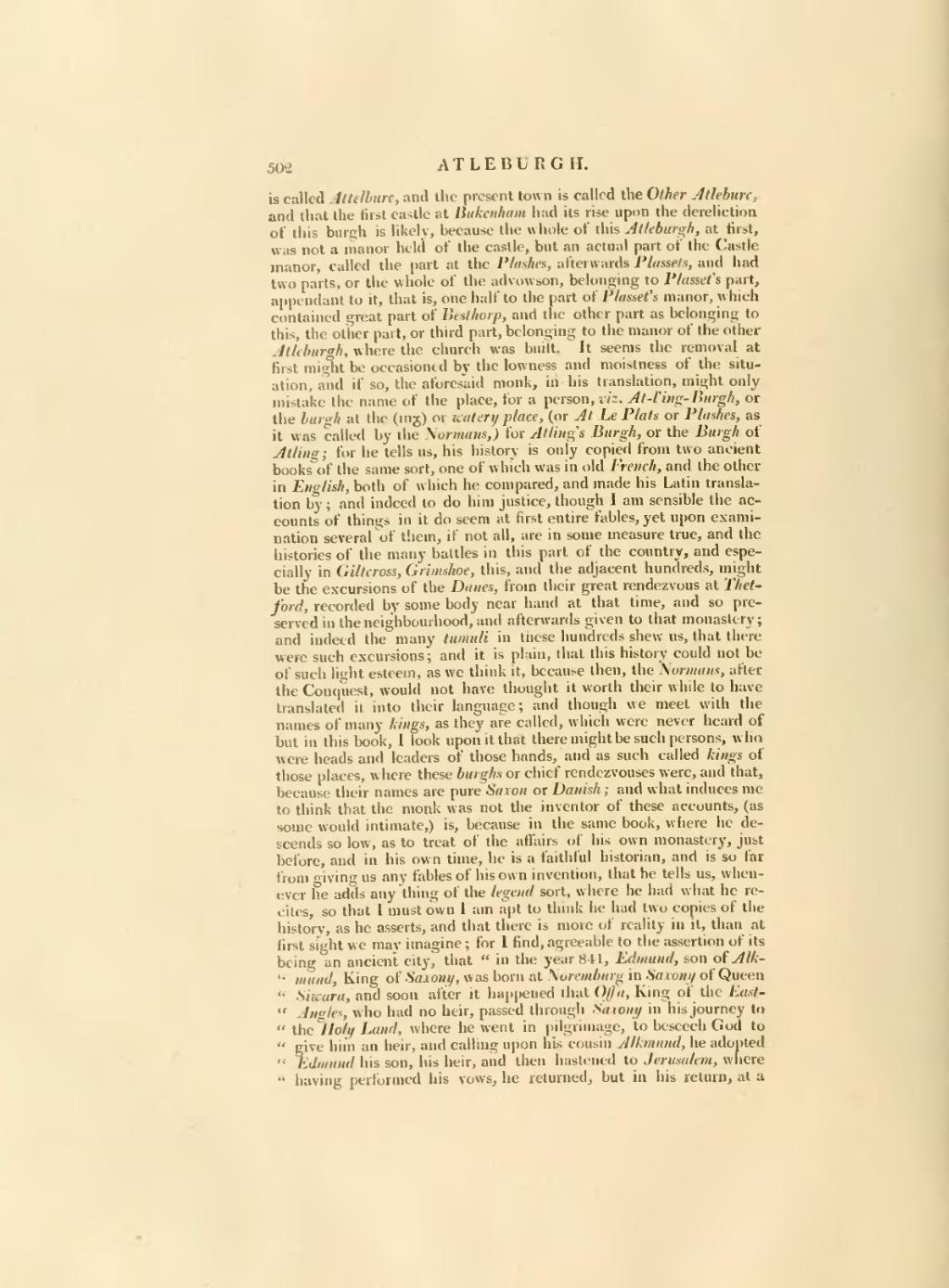is called Attelburc, and the present town is called the Other Atleburc, and that the first castle at Bukenham had its rise upon the dereliction of this burgh is likely, because the whole of this Atleburgh, at first, was not a manor held of the castle, but an actual part of the Castle manor, called the part at the Plashes, afterwards Plassets, and had two parts, or the whole of the advowson, belonging to Plasset's part, appendant to it, that is, one half to the part of Plasset's manor, which contained great part of Besthorp, and the other part as belonging to this, the other part, or third part, belonging to the manor of the other Atleburgh, where the church was built. It seems the removal at first might be occasioned by the lowness and moistness of the situation, and if so, the aforesaid monk, in his translation, might only mistake the name of the place, for a person, viz. At-Ving-Burgh, or the burgh at the [ing] or watery place, (or At Le Plats or Plashes, as it was called by the Normans,) for Atling's Burgh, or the Burgh of Atling; for he tells us, his history is only copied from two ancient books of the same sort, one of which was in old French, and the other in English, both of which he compared, and made his Latin translation by; and indeed to do him justice, though I am sensible the accounts of things in it do seem at first entire fables, yet upon examination several of them, if not all, are in some measure true, and the histories of the many battles in this part of the country, and especially in Giltcross, Grimshoe, this, and the adjacent hundreds, might be the excursions of the Danes, from their great rendezvous at Thetford, recorded by some body near hand at that time, and so preserved in the neighbourhood, and afterwards given to that monastery; and indeed the many tumuli in these hundreds shew us, that there were such excursions; and it is plain, that this history could not be of such light esteem, as we think it, because then, the Normans, after the Conquest, would not have thought it worth their while to have translated it into their language; and though we meet with the names of many kings, as they are called, which were never heard of but in this book, I look upon it that there might be such persons, who were heads and leaders of those bands, and as such called kings of those places, where these burghs or chief rendezvouses were, and that, because their names are pure Saxon or Danish; and what induces me to think that the monk was not the inventor of these accounts, (as some would intimate,) is, because in the same book, where he descends so low, as to treat of the affairs of his own monastery, just before, and in his own time, he is a faithful historian, and is so far from giving us any fables of his own invention, that he tells us, whenever he adds any thing of the legend sort, where he had what he recites, so that I must own I am apt to think he had two copies of the history, as he asserts, and that there is more of reality in it, than at first sight we may imagine; for I find, agreeable to the assertion of its being an ancient city, that "in the year 841, Edmund, son of Alkmund, King of Saxony, was born at Noremburg in Saxony of Queen Siwara, and soon after it happened that Off a, King of the EastAngles, who had no heir, passed through Saxony in his journey to the Holy Land, where he went in pilgrimage, to beseech God to give him an heir, and calling upon his cousin Alkmund, he adopted Edmund his son, his heir, and then hastened to Jerusalem, where having performed his vows, he returned, but in his return, at a
